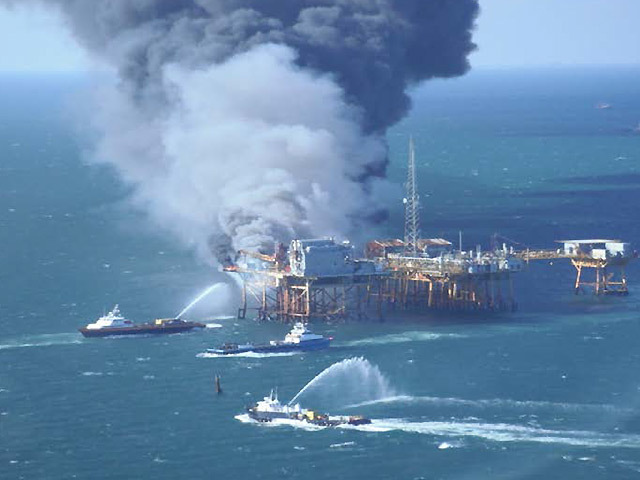
Wood Group PSN has been ordered to pay out $9.5million for false reporting of safety inspections and clean water act violations that led to an explosion in the Gulf of Mexico.
The US Department of Justice made the announcement regarding the firm’s involvement in two separate cases.
The service company was ordered to pay $7 million for falsely reporting over several years that personnel had performed safety inspections on offshore facilities in the Gulf of Mexico in the Western District of Louisiana.
Another fine of $1.8 million was imposed for negligently discharging oil into the Gulf of Mexico in violation of the Clean Water Act after an explosion on an offshore facility in the Eastern District of Louisiana.
The announcement was made by Acting Assistant Attorney General Jeff Wood of the Justice Department’s Environment and Natural Resources Division, U.S. Attorney for the Western District of Louisiana Stephanie A. Finley, and U.S. Attorney for the Eastern District of Louisiana Kenneth A. Polite.
Wood Group PSN was also ordered to pay $700,000 in community service to projects in the areas where the criminal conduct took place.
Acting Assistant Attorney General Wood said: “The events of November 2012 at West Delta 32 were tragic, and since then federal prosecutors have worked diligently to investigate and understand the full scope of criminal conduct.
“Today’s plea agreement demonstrates the Department of Justice’s commitment to the integrity of federal safety programs and accountability for those who falsify federal safety inspection reports.
“In addition, the plea agreement ensures that Wood Group is held responsible for its wrongful pollution of the Gulf of Mexico, and it will bring community service projects to benefit the Gulf of Mexico and Gulf Coast communities.”
According to the company’s plea agreement, from April of 2011 to July of 2014, employees at Wood Group PSN’s Cameron, La., office failed to inspect and maintain facilities they had contracts with on the Outer Continental Shelf’s Creole Loop.
They also falsely indicated that the facilities had been properly inspected and maintained according to federal safety and environmental regulations.
According to the DoJ. the company operators at the Cameron office had trouble keeping up with inspections and maintenance on facilities they serviced.
The office did not have sufficient labor and transportation, and the work was not always completed on time.
The employees, from operators to clerks, then falsified reports to the Bureau of Safety and Environmental Enforcement.
The company admitted to 87 violations on offshore platforms.
Wood Group PSN’s Clean Water Act conviction stems from an explosion on Black Elk Energy Offshore Operations, L.L.C.’s (BEE) offshore oil production facility located at area West Delta 32 in the Gulf of Mexico.
According to court documents, BEE had contracted with Wood Group PSN for individuals to man and conduct production operations at the West Delta 32 facility.
Beginning on November 3, 2012 and continuing through November 16, 2012, construction was being conducted at the West Delta 32 facility. Wood Group PSN supported the construction by issuing hot work permits for welding.
However, starting on or about Nov. 10, 2012, the Wood Group PSN Person-in-Charge, Christopher Srubar, stopped issuing hot work permits and conducting all-hands safety meetings, and instead delegated the hot work permitting to a less experienced operator.
On Nov. 16, 2012, Grand Isle Shipyards, Inc. (GIS) construction superintendent, Curtis Dantin, assigned workers to perform welding in three different areas of the “E” platform, including sump line piping that had previously contained hydrocarbons but had not been made safe for hot work, or identified in a permit as an area safe for hot work.
The sump line piping led to an oil storage tank that contained hydrocarbons contaminated with water, also known as the wet oil tank.
After the construction workers had cut and grinded the sump line piping the morning of Nov. 16, they attempted to weld on the cut piping with an arc welder.
At that time, hydrocarbon vapors that had escaped from the wet oil tank ignited.
The ignition caused an explosion setting off a series of additional explosions in the three oil tanks on the “E” platform.
One of the dry oil tanks and the wet oil tank were blown into the Gulf of Mexico.
The other dry oil tank was blown off its base and destroyed the platform crane. Oil spilled into the Gulf of Mexico causing a sheen on the water.
Oil rained down to the lower deck of the platform where workers had been performing other construction activity.
The fire and explosions that occurred resulted in the deaths of construction workers, Avelino Tajonera, Elroy Corporal, and Jerome Malagapo. Other workers were seriously burned and physically injured.
Wood Group PSN admitted that its employees were negligent in the way they authorized hot work on West Delta 32, and that a lack of communication between personnel on the platform, including Wood Group PSN’s Person-in-Charge, Christopher Srubar, contributed to the events that caused oil to be discharged into the Gulf of Mexico in a harmful quantity.
Update:
Wood Group said that safety and assurance is always the firm’s highest priority and that steps had been taken to avoid repeat incidents.
A spokesman said: “We have taken significant steps to protect against such incidents recurring, including restructuring our business to improve governance and accountability, and deploying best practices and key learnings from across our global operations.
“Over the last five years we have spent more than $42 million on safety training for the Gulf of Mexico.
“We deeply regret these incidents occurred and we cooperated fully with the government and relevant regulatory bodies throughout both investigations.
“These agreements provide a clear outcome that will enable us to continue to focus on our Gulf of Mexico business and our ongoing commitment to providing our people with the training, tools and management support they need to work safely and with the utmost integrity.”